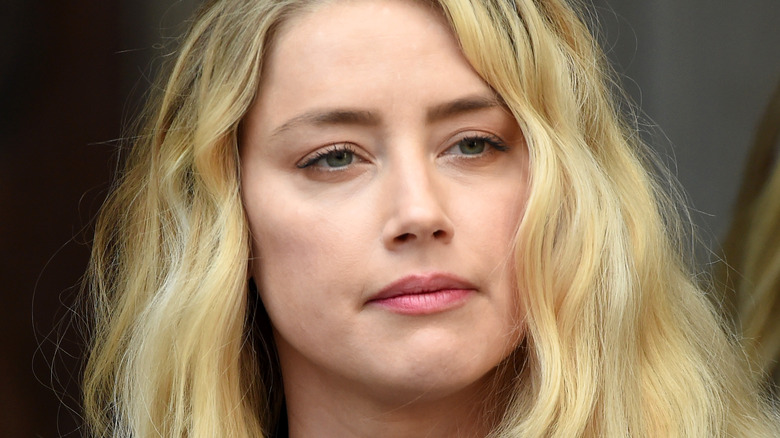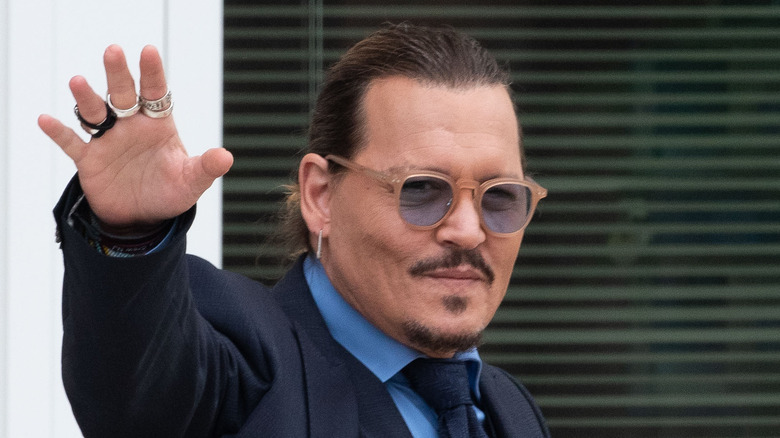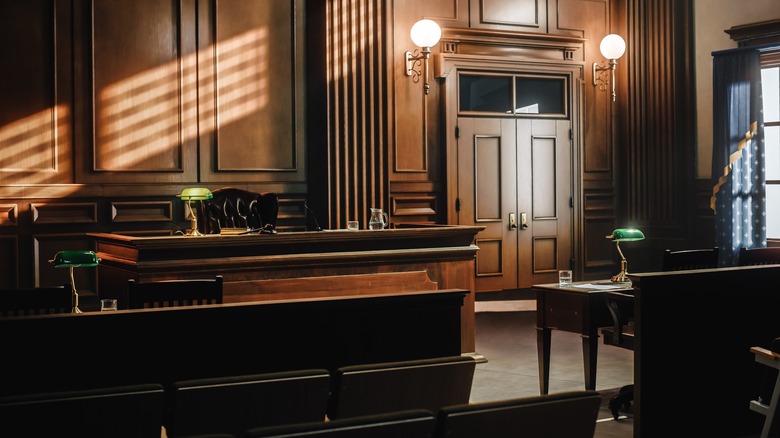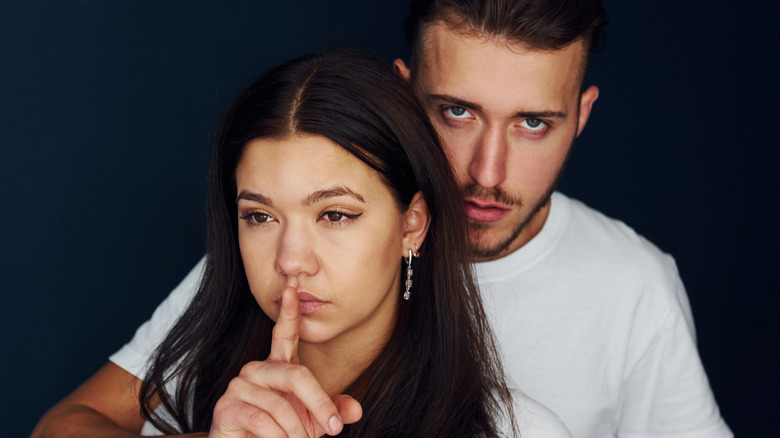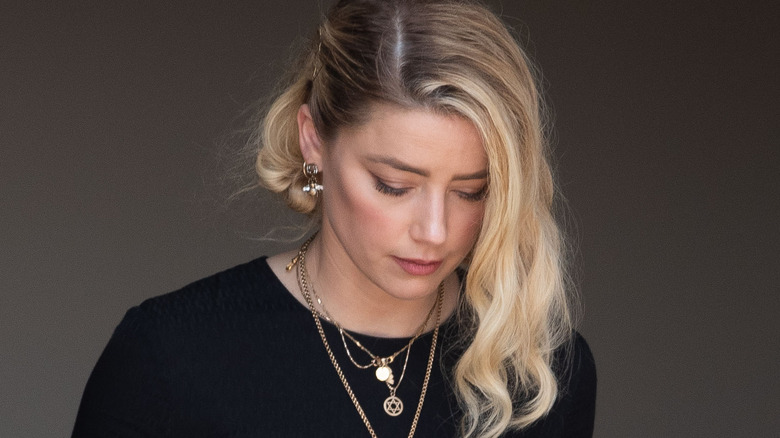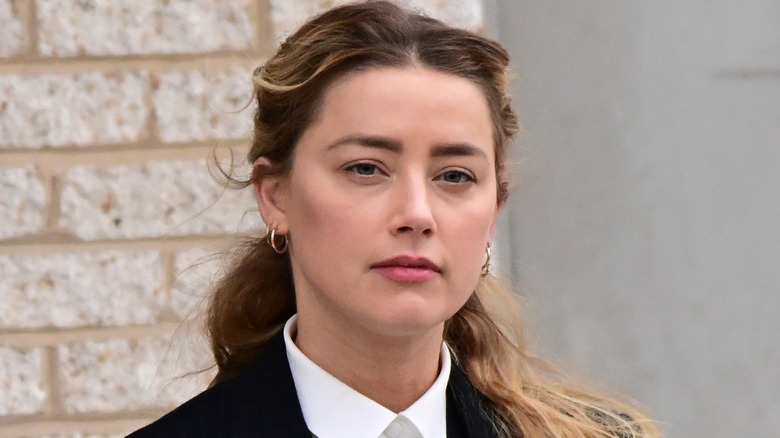Dozens Of Women's Rights Activists Sign Open Letter About Amber Heard
The defamation lawsuit Johnny Depp against Amber Heard has been a watershed moment for the way domestic violence allegations play out in the United States justice system. Some survivors told NBC News that Depp saying that he was a victim was an empowering moment for male victims of intimate partner violence. But in an open letter published on November 16, many advocates and activists are arguing the verdict of the trial does the exact opposite.
In case you forgot, Heard published an op-ed in The Washington Post with a headline read: "I spoke up against sexual violence — and faced our culture's wrath. That has to change." Court records show it was this headline along with three other points in the op-ed Depp has taken (legal) issue with, none of which name Depp specifically. Heard counter-sued, the New York Times adds, claiming defamation for when Depp said her abuse accusations were a "hoax" in a British tabloid in 2020.
The jury did find that Depp defamed Heard and awarded her $2 million in damages, per the New York Times. But, confusingly, the jury also found that Depp had been defamed by Heard and awarded him $15 million — a verdict that has many concerned about how the court system is being weaponized. This includes Laura Richards, a criminal behavioral analyst and host/creator of "Crime Analyst", who signed the open letter and shared her thoughts with The List about why the verdict of this trial is so dangerous for domestic violence victims.
Johnny Depp lost a domestic violence defamation lawsuit in 2020
Back in 2020, Johnny Depp sued The Sun, a British newspaper, for libel after the paper claimed he had been violent to his ex-wife, Amber Heard, during their marriage. Following the op-ed Heard wrote, many questioned JK Rowling for supporting Depp being cast in the "Harry Potter" spin-off series, "Fantastic Beasts and Where to Find Them," including The Sun (via CNN).
According to Rolling Stone, The Sun had to prove their claims of Depp being a "wife beater" and they were able to, using Heard's own testimony as part of their proof of 14 separate alleged instances of domestic violence. In defense, Depp's team practiced the same strategy that we saw just this spring, where they in turn accused Heard of being the primary aggressor in their relationship. Rolling Stone adds that Heard had also previously filed a restraining order against Depp one month after Variety reported Depp claimed Heard "or one of her cohorts" left human feces in his bed.
Regardless, 129-page decision, Judge Andrew Nichol of the United Kingdom's High Court found 12 of the 14 events detailed during the trial to be "substantially true." It's why many were so shocked when a jury sided with Depp in Virginia: Mark Stephens, an international media lawyer, told the BBC that it's "very rare" that essentially the same case is tried on two sides of the pond and gets different results.
The weaponization of defamation lawsuits
At the beginning of the #MeToo Movement, Ashley Judd was one of the many women who came forward with sexual violence allegations against Harvey Weinstein. The New York Times explains Judd couldn't press charges against Weinstein because the event happened too long ago. She was, however, able to file a defamation lawsuit after a director revealed in an interview Weinstein's company called Judd a "nightmare to work with."
If you had the money, defamation lawsuits were suddenly a renewed way of getting justice against an abuser. But even in 2020, when the Times article was written, advocates were concerned this would silence victims, not empower them. If you have enough power and money, defamation lawsuits can be used to try and rehab a reputation which, according to the Times, Johnny Depp has been trying to do for years.
"Abusers can sue their victims for sharing their experiences," the Chicago Alliance Against Sexual Exploitation explains, "forcing them to prove their statements are the truth in court or pay damages." The claims don't need merit to be brought to court, just money, the Alliance explains, though some states have anti-SLAPP (Strategic Lawsuits Against Public Participation) laws that allow the defendants to ask the court to dismiss the lawsuit.
California, where Depp and Amber Heard both live, gives defendants the chance to file a motion to dismiss a case within 60 days of being served, explains law firm Holland & Knight. Virginia does not.
Defamation lawsuits are being used to silence victims
In a review of court documents and news reports, Mother Jones found that between 2014 and 2020, there were at least 100 defamation lawsuits filed against accusers. Three out of every four claims, they added, were male college students and faculty who has been accused of sexual misconduct, suing their accusers and the schools in their defamation lawsuits.
Equality Now, an advocacy group for women's rights, told Ms. Magazine back in January 2022 that they'd seen a "global rise in defamation lawsuits" being used as a retaliation weapon to silence women who speak out against the abuse they've experienced. They also found that, just like with the case of Heard and Depp, some of these lawsuits have been filed despite the fact the abuse was "officially confirmed."
Laura Richards — who founded the Paladin National Stalking Advocacy Service and developed the Domestic Abuse, Stalking and Harassment and Honor-based (DASH) risk assessment model — told us over e-mail she's seen these "serious and wide-reaching consequences" of the Depp v. Heard case. "These women were already frightened and fearful before," she explained, saying that they're even more afraid to speak up about abuse now than they were before. "Many believe it is better to stay silent and feel the system is weighted against them." The jury finding claims of abuse to be defamatory despite the amount of evidence Heard provided "sent a clear and chilling message to victims," Richards told us.
Amber Heard's likability was on trial
As the open letter about the verdict points out, the "vilification" of Amber Heard "was fueled by disinformation, misogyny, biphobia, and a monetized social media environment where a woman's allegations of domestic violence and sexual assault were mocked for entertainment."
Even before the verdict came out mostly in Johnny Depp's favor, it was clear fans were already siding with him. If you were on social media at all during the time of the trial, you probably saw bot-fed hatred against anyone posting pro-Heard comments or facts about the case (via the Los Angeles Times). But it wasn't all inorganic; according to the New York Times, TikTokers turned video of Heard blowing her nose turned into speculating she was snorting cocaine on the stand. Another video shows a woman reading Depp's abusive text messages with "orgiastic reverence." Even the Instagram page for the open letter was suspended within a day of its creation.
When the verdict came out, behavioral analyst Laura Richards and Lucia Osborne-Crowley, a journalist, discussed on "Crime Analyst" the hate and harassment they received even just for sharing quotes from Heard's lawyers or other facts about the case. "I've never seen anything like this across my career," Richards admitted on Episode 78, "this level of vitriol and misogyny, quite frankly, and we don't just see it in society; we see it in courtrooms, we see it all over the place, and not just in one way."
The myth of the perfect victim
There was in the opinion of many, including the jury who deliberated on the Johnny Depp v. Amber Heard trial, that there was enough evidence to prove Depp had been abusive to Heard in the past (via CNN). In Heard's counterclaim against Depp, the jury found that "Depp, through his lawyer Adam Waldman, defamed her by calling her abuse accusations a "hoax" in the press," per Entertainment Weekly. It's a decision the magazine adds that Depp filed to appeal the verdict in early November.
What all of this shows to the growing number of groups and activists who have signed the open letter is that there is a "fundamental misunderstanding of intimate partner and sexual violence and how survivors respond to it." What people are looking for, Time explains, is the "perfect victim." Both Heard and Depp demonstrated their humanity on the stand, but it was only Heard who received public backlash.
In Episode 79 of "Crime Analyst," Laura Richards and Lucia Osborne-Crowley also discussed how victims now feel the burden of proof now feels higher than ever. Despite the ruling of the trial in the UK, the photo evidence, witness testimony, and text messages proving Heard was being physically abused, the fact that the jury felt she was lying is a terrifying reality. This is especially true for victims of psychological abuse and coercive control, who don't have physical injuries to document.
